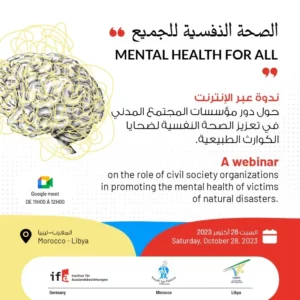Last Saturday, an online learning exchange unfolded, igniting a wave of innovation and collaboration between peacebuilders and civil society actors from Libya and Morocco. Their shared mission? To delve into the intricacies of mental health and its profound significance in the aftermath of natural disasters.
This virtual exchange did more than just highlight the pivotal role of mental health; it also underscored the invaluable contributions of civil society actors in bolstering psychological support and mental well-being in disaster-stricken regions.
In this enlightening event, Moroccan representatives, comprising civil society advocates and university researchers, engaged in a knowledge-sharing dialogue with their Libyan counterparts. Together, they explored the landscape of mental health initiatives following disasters in Libya. Notable figures in this exchange included Zakaria El Hamel, the President of the Moroccan organization Youth for Peace, and Musa Ali Wantiti, the President of the Libyan Tizgar Foundation. Through their respective foundations, Zakaria and Musa have fostered a platform for Moroccan and Libyan civil society actors to exchange knowledge, expertise, and establish vital networks. The event, aptly titled “Mental Health for All,” was designed to facilitate a fruitful exchange of ideas and insights between the two organizations.
Libyan civil society participants shared their experiences in providing mental health support in the wake of recent natural disasters in their country. They have spearheaded programs and support groups to aid victims both socially and mentally, with the noble aim of preserving peace and mitigating the potential mental crises and shocks that can further destabilize society.
On the other side, the Moroccan researchers emphasized the fundamental role that mental health plays in building a healthy and stable society. Abdellah Lahsaini, one of the Moroccan participants, stressed that while we can gauge the severity of various physical ailments, mental health disorders carry a weight akin to mortality itself, affecting not just the individual but their entire family. Regrettably, mental well-being often takes a back seat in public health agendas. Urgently, they called upon global and national bodies to prioritize mental health.
Ahmed Qaliwan, a member of the General Assembly of the psychosocial support team in Libya, elucidated how the Libyan team regularly interacts with victims and provides support to the best of their abilities. He highlighted the significance of the online sessions and the “Mental Health for All” event, which offered diverse experiences from Libya and Morocco. He emphasized that civil society must exert pressure on governments and institutions to actively support the mental well-being of disaster victims. This support, he asserted, should come from all specialized rescue teams, state actors, and civil society, with a heightened focus on raising awareness about psychological and mental health.
A feminist perspective on mental health was a prominent theme throughout the event. Dr. Sharifa Mayouge, a Professor of Psychology at the College of Education, Maryem Al Hweynet Zinab, a Legal consultant and Executive Director of the Human Rights Organization for Transparency and Reform, and Moftah Mohammed, all experts in the field, shed light on the pivotal role that women can play in providing mental support during and after disasters. Even though women are at higher risk due to their disproportionate vulnerability to family violence and caregiving responsibilities, they can be instrumental in bolstering mental health when provided with the appropriate means and conditions that enhance their role as peacekeepers with exceptional communication skills.
The work carried out by Libyan civil society to support disaster victims mentally is rooted in the inclusion of women, youth, and active members. Their vision revolves around the prevention and management of existing and potential mental disasters and conflicts. The work also seeks to support victims more effectively by raising awareness and creating safe spaces for communication, thus dispelling the stigma surrounding mental health, which is still considered a taboo before, during, and after disasters in the Maghrebin context.
The online event, “Mental Health for All,” funded by ifa (Institut für Auslandsbeziehungen), concluded with a call to action for future platforms dedicated to dialogue, knowledge exchange, and aiding victims of earthquakes and floods. This remarkable exchange has set the stage for a brighter, more resilient future in the realm of mental health support.

